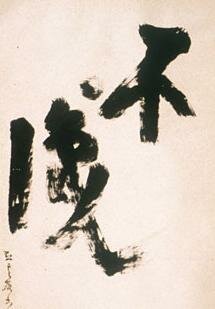から衣着つつなれにしつましあればはるばる来ぬる旅をしぞ思ふ
karakoromo kitsutsu narenishi tsuma shi areba
harubaru kinuru tabi wo shi zo omou
"Traveling in faraway places, I recall the old days
wearing my Chinese-style garments and being with my beloved wife..."
Ariwara no Narihira, Ise monogatari 9.
Literally: "While [I] was wearing Chinese-style [splendid] robes, [I] got used to an [equally splendid] wife; so it is sad to make these long travels." I reversed the order of the two lines, so that the fond memory of old days is more emphasized, and to sound less like complaining. I also tried to soften the meaning that the "splendid wife" is just in line with a "Chinese style robe".
I know several different translations of this poem. Some translators assume that it is the wife that has got accostumed to wearing the Chinese robes: "I had a wife that was wearing splendid Chinese robes..." Tempting solution, since it eliminates the problem of Narihira being equally fond of his wife and his gardrobe. But the use of the tsutsu suffix on kiru separates it from the verb nareru, and carries a sense of simultaneous actions.
Another interpretation that I have seen: "I got used to my dear wife just like one gets used to his old Chinese style robes..." This again avoids placing the wife and the robe on the same shelf, but I just think this is not what is written in the original poem.
Translation (C) 2007 by Zoltan Barczikay.
